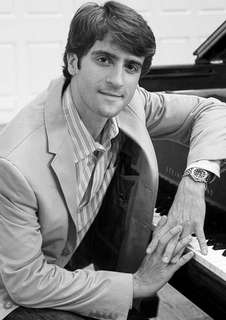|
Back
Breaking Up Is So Easy To Do New York
BargeMusic, Old Fulton Street, Brooklyn
07/03/2009 -
Johann Sebastian Bach: Selections from Partita No. 4 in D Major, BWV 828
Béla Bartók: Movements from Suite, Opus 14, Sz. 62
Ludwig van Beethoven: Selections from Seven Bagatelles for Piano, Opus 33 – Piano Sonata No. 15 in D Minor, Opus 28 (“Pastorale”)
Johannes Brahms: Selections from Seven Fantasias for Piano, Opus 116
György Ligeti: Musica Ricerata, No. III
Sergei Rachmaninoff: Etude-tableau in A Minor, Opus 39, No. 6
David Kaplan (Piano) 
David Kaplan (© Courtesy of David Kaplan)
Cambridge literary philosophers would have lauded David Kaplan’s program at BargeMusic last night, for his was a musical specimen of literary deconstructionism.
The first half wasn’t devoted to compositions per se. Instead, the young artist broke up established music. He took single movements from complete works, mixed them up with other sections of other works, placed them around an arbitrary set of divisions (“Prelude”, “Scherzo”, ‘Romance”, Presto”) and set out to see what effects they might have.
BargeMusic was the right place for this experiment, for even if it hadn’t worked, we would have had that gorgeous background window on the East River, with sailboats and yachts passing by under the setting sun. But in some ways, Mr. Kaplan was successful.
Up to a certain point. Since he is a most consummate artist for many styles, his pianism was enjoyable in itself. Second, both the Beethoven Bagatelles and Brahms pieces, were not exactly “full” works, but stood on their own. Third, Mr. Kaplan’s rationale for deconstructing the music had the logic of showing a historical kinship of different forms.
Aesthetically, though, this was not entirely convincing. Beethoven’s Opus 33 Bagatelles are not similar, but each bears an unfinished spontaneity. We are privy to the composer’s mind, unedited (well, minimally edited), purely inspired, written for a jaunty party. They have a singularity which makes the whole series interesting.
Brahms’s Intermezzi and Capriccios are equally appealing—especially with Mr. Kaplan’s playing. Not that he is deficient in other music, but when he launched into the first D Minor Capriccio or ended with the second D Minor Cappriccio, it was obvious that he is a player of the highest order. And how this writer would have loved to hear Brahms in all his incarnations together.
Kaplan is also a wonderful Bach player, each of the four movements played not only gracefully but with a transparency of contrapuntal lines. Yet the dances of this Partita revolve around the centerpiece of an Allemande which is moving, profound and with an almost passionate lyricism.
That movement, alas didn’t make it into Mr. Kaplan’s litany.
He did break up one complete Suite but Bartók movements were played with the same bumptious joy (and strange pauses) of the Beethoven. And one vivacious movement from Ligeti not only showed Mr. Kaplan’s dexterity but was the apotheosis from the final “Presto” section of the recital.
After the intermission, Mr. Kaplan played a complete work, Beethoven’s “Pastorale” sonata, and outside of its own worth, it gave the lie to “breaking” music. Beethoven didn’t use a cyclical theme to bring these four movements together. Instead, his genius allowed each movement to express another temperament of a particular emotion.
Could I name that emotion, music wouldn’t be necessary. Let’s just say that Opus 28 has neither the Promethean pain or the Rabelaisian ribaldry of his other works. It is a bit show-offy (and Mr. Kaplan handled the scales with his usual deftness), it is placid but never apathetic, and one has the feeling that Beethoven, leaving both soul and emotion behind, let out his heart.
Mr. Kaplan was most admirable here as in the other works. The only question, then, was whether his experiment in deconstructing compositions might have crossed the borderline into needless decomposing. No, it never reached that literal dead end, but a musical gambit is hardly necessary for such a dexterous and sensitive artist.
Harry Rolnick
|